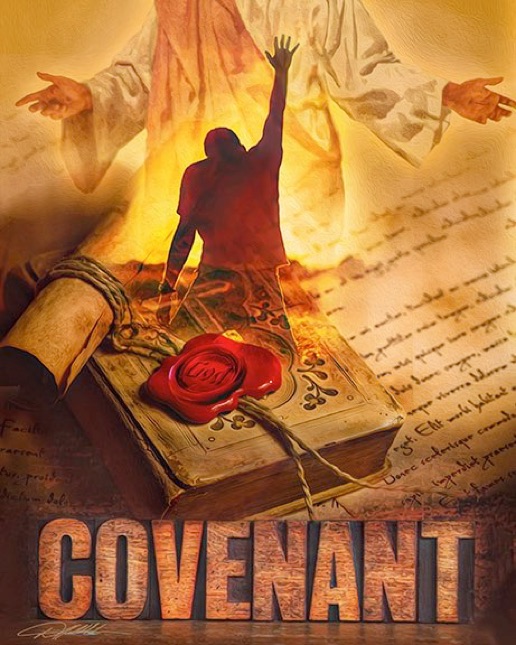COVENANT

Covenant
Covenant. A word we do not use much here in the western civilization, but quite common today in the middle east. We tend to lean more on terms like contracts or agreements, both which are far inferior to an actual covenant.
A covenant is an agreement between two parties but far more binding in their implications than mere agreements or contracts. A contract can be (and often is) broken, whereas a covenant is far more binding between the parties involved, much like covenants in the Bible. There are two basic types of covenants: conditional and unconditional. A conditional or bilateral covenant is an agreement that is binding on both parties for its fulfillment. Both parties agree to fulfill certain conditions. If either party fails to meet their responsibilities, the covenant is broken and there are serious consequences that evolve from that broken agreement. Many such covenants required not only an exchange of solemn vows but also an exchange of blood between the parties in agreement.
Even in this country many years ago, the American Indian had covenants which involved blood as a binding factor. Both parties would vow to one another and then cut their hands with knife and join hands in a firm grasp, mixing ones blood with the another, signifying a sacred bond within the agreement between them. Blood signifies life and in performing these solemn vows to one another, mixing of ones blood, the commitment was for life. In fact, in middle eastern cultures years ago, the period of time was not only for the extent of one's life but for many generations after as well. Covenants were considered life binding agreements, held in high regard, and there were serious consequences if the covenants were broken.
There have been many covenants between God and man. The first divine-human covenant was between God and Adam. God established a covenant with Adam in which God promised dominion over all the earth to mankind in return for obedience. Adam reneged on that covenant by eating the forbidden fruit, and as a result, as expelled from Paradise. The consequences of breaking this covenant were that of sin, paid for in blood, the blood of animals.
Later, God establishes a covenant with Noah (Isaiah 54:9). That covenant affirms God’s commitment to Noah and all mankind after the flood, that He (God) would not flood the earth ever again. God basically signed His name on the dotted line by presenting a rainbow promising that a suspension of the natural order will never again interrupt. (Gen. 8:21)
Later, God went into a covenant with Abraham requiring all males in Abraham’s line were to be circumcised. Any descendant of Abraham who refused circumcision was declaring himself to be outside of God’s covenant; this explains why God was angry with Moses when Moses failed to circumcise his son (Exodus 4:24–26).
God goes into a covenant with all of Israel in Exodus 19:5–6.
"Now therefore, if you will indeed obey My voice and keep My covenant, (10 commandments) then you shall be a special treasure to Me above all people; for all the earth is Mine. And you shall be to Me a kingdom of priests and a holy nation.’ These are the words which you shall speak to the children of Israel.”
This covenant also encompasses the divine-human relationship between Yahweh and Israel. Sacrificial worship, particularly on the Day of Atonement (Lev 16), would ritually atone for Israel’s sin and symbolically express God’s forgiveness which guaranteed the preservation of human life on earth, establishing a royal line through which Abraham’s ultimate “seed” (Christ) and covenant heir would eventually come. (Gal 3:16).
Throughout the old testament we see the blood used for the covenant was that of animals. However things changed with the arrival of Jesus whereby we enter into a new covenant and God will now use His own blood, the blood of His Son, to seal the deal. “I will be their God, and they will be my people”. In this new covenant, all the hopes and expectations of previous covenants will attain climactic fulfillment and supernatural expression.
In the Lord’s Last Supper, Jesus connects both Gods forgiveness and the blood associated with the establishment of the old covenant. Not only does Jesus exercise a permanent, perfect, and heavenly priesthood, but a covenant of which he is mediator, secured through the blood of Christ, “the blood of the eternal covenant”. Unlike the old covenant, this new covenant is unbreakable and eternal.
In Jesus—the promised “seed” of Abraham, God’s covenant promises for both Israel and the nations have come to fruition. The ultimate expression of God’s creative and redemptive goal awaits fulfillment in reality of a new creation, the creation and gathering of many, becoming one with Him and in Him - the Bride of Christ.
Only then will the hope expressed in the age-old covenants be most fully experienced in the present and the present hereafter.
"No longer will there be any curse. The throne of God and of the Lamb will be in the city, and his servants will serve him. They will see his face, and his name will be on their foreheads. There will be no more night. They will not need the light of a lamp or the light of the sun, for the Lord God will give them light. And they will reign for ever and ever."
Revelation 22:3-5
------------------------
Just as sacred marriage vows of this age, are to be solemn, meaningful commitments, so it is also true within the sacred marriage vow as the bride of Christ. As our vows (covenant) are to make us one with each other before the eyes of the Lord, so to is the new divine covenant between Christ and His bride. When do we exchange vows and make our covenant with one another between God and us? When we accept Christ into our hearts.
When we accept Christ in our lives, we have entered into a divine covenant with God. A sacred and spiritual covenant with the great I AM. In this covenant, there is not merely an exchange of blood between the parties, but an exchange of entire lives - one life for another. Christ gave His life for us, and in exchange, we are to give up our lives for Him. Once we accept Christ into our life, our life in not our own. We have been bought and paid for through the blood of the Lamb. We are His, and He is ours. The covenant of all covenants, never to be broken nor shall ever expire.
Covenants are only as good as the integrity of those who make them. God will never go back on His word nor His promises. This covenant shall be eternal. He is our God and we are His children. That as we abide in Him, He shall protect, comfort and provide for us throughout eternity.
In many old eastern traditions regarding covenants, each party would cut their hands, like the American Indians use to do, but instead of putting their hands grasped together, the eastern way was to squeeze the hand, let the blood rip into a glass of wine and each would drink from it. Signifying the commitment to the covenant. The cutting of hands was a sign of commitment to one another. Those cuts often left scars and when shown, even at a distance, would tell of that covenant commitment.
The American Indians from a distance would raise a hand toward one another in greeting. Not to say "How!" like the old western movies suggested, but to show the scar on their hands from the covenant made to one another, letting the other know who they were and reminder to the commitment they made.
Did you ever wonder why we all seem to have a desire to raise our hands when we worship and praise? It is like instinct, we just do it. Well perhaps we raise our hands to show the Lord of our commitment as well. We do not only raise one hand (showing a scar) but we raise both hands. Why? Because we did not merely cut our hands in the covenant, we gave our lives in the covenant. And when we raise both hands high for the Lord to see, the Lord Jesus Christ opens His hands for us to see His scars, the nail pierced hands that He gave His life for us too!
-------------------------------------------
There is however, one last area regarding covenants I need to express: Be mindful and careful of the covenants you enter into. Do not enter into a covenant with the devil. You may say, "Of course not. I would never do that." Yet sad to say, many do just that unknowingly at times. Remember, a covenant is an agreement between two parties, therefore, by agreeing with the devil's accusations against you in self condemnation for things done in the past, you are essentially entering into a covenant with him and by doing so, you give him legal right to continue this abuse . Do not do this.
Paul writes in Romans 8:1 , "There is therefore now no condemnation for those who are in Christ Jesus. "
Remember this verse. Plant it deep within your memory and repeat it to the devil when he tries to make you feel unworthy or un-Christian because of past sins or actions. The past is the past. It is the devils territory. Do not go there nor be led there by the devil. Move forward in life, not backward. The past, even seconds later, is still the past. They are forgiven and forgotten.
Psalm 103:12
"As far as the east is from the west,
So far has He removed our transgressions from us.
How far is that? An immeasurable distance, for East and west can never meet.
Memorize Romans 8:1 , "There is therefore now no condemnation for those who are in Christ Jesus. " Simply speak it out when ever the devil attacks you and reminds you of your sins and failures. Use the Sword of the Spirit. The Sword of truth will cut through his lies like a hot knife through soft butter.
Accusations and condemnation is the foundation which the devil relies on to weaken and tear down a Christian. If he can enter into a covenant with you (in an agreement) then he has legal right to continue this destructive path, leaving you weak and un-defensive through your mind. Cut him down. The sword of the Spirit, the Sword of truth, shall cut his lies down before you. It is your weapon, your only offensive weapon in the Armor of God. Use it.
The covenant you choose will be the one you live by... or die by. Choose life!



